

Individuellt samtal elev lärare 2. Educational Technology and Mobile Learning: 9 Effective Questions to Help Students Develop A Growth Mindset. November 1, 2014 When it comes to high quality education blog posts.
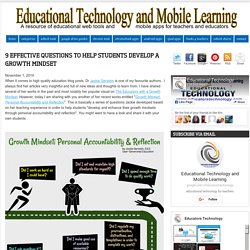
Dr Jackie Gerstein is one of my favourite authors. I always find her articles very insightful and full of new ideas and thoughts to learn from. I have shared several of her works in the past and most notably her popular visual on The Educators with a Growth Mindset. However, today I am sharing with you another of her recent works entitled "Growth Mindset: Personal Accountability and Reflection".
Educational Technology and Mobile Learning: Beautiful Visual Featuring 7 Ways to Do Formative Assessments in Class. October 30, 2014 Below is an excellent visual that features some handy ideas on how to carry on formative assessments in your class.
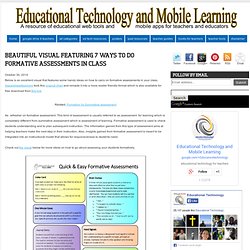
Squareheadteachers took this original chart and remade it into a more reader friendly format which is also available for free download from this link. Formativ bedömning gör lärande synligt. Verktyg för formativ bedömning. Store.scholastic.com/content/stores/media/products/samples/21/9780545087421.pdf. Examples of Formative Assessment. When incorporated into classroom practice, the formative assessment process provides information needed to adjust teaching and learning while they are still happening.
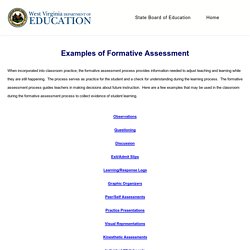
The process serves as practice for the student and a check for understanding during the learning process. The formative assessment process guides teachers in making decisions about future instruction. Here are a few examples that may be used in the classroom during the formative assessment process to collect evidence of student learning. Observations Questioning Discussion. 22 Easy Formative Assessment Techniques for Measuring Student Learning. I came across Terry Heick’s blog – 10 Assessments You Can Perform In 90 Seconds – at TeachThought from earlier this year and really enjoyed the formative assessment strategies that he outlined.
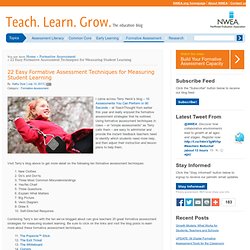
Using formative assessment techniques in class – or “simple assessments” as Terry calls them – are easy to administer and provide the instant feedback teachers need to identify which students need more help, and then adjust their instruction and lesson plans to help them. Visit Terry’s blog above to get more detail on the following ten formative assessment techniques: 20 Questions To Guide Inquiry-Based Learning. 20 Questions To Guide Inquiry-Based Learning Recently we took at look at the phases of inquiry-based learning through a framework, and even apps that were conducive to inquiry-based learning on the iPad.
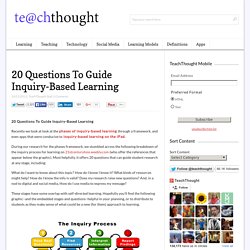
During our research for the phases framework, we stumbled across the following breakdown of the inquiry process for learning on 21stcenturyhsie.weebly.com (who offer the references that appear below the graphic). Most helpfully, it offers 20 questions that can guide student research at any stage, including: Assessment for learning: are you using it effectively in your classroom? Engagement and effort are essential characteristics of good learners.
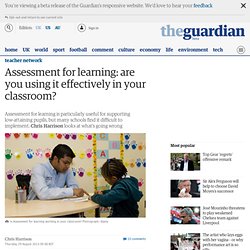
Research indicates that children who start school socially and academically ahead of their peers tend to be more successful in school. This results in an achievement gap, which widens as children move through the school system if it persists. One of the factors that can influence this is the way assessment is perceived by youngsters who start at a disadvantage; it can either strengthen or break their belief in their capabilities. Schools in England have become data driven; teachers are heavily influenced by the need to produce summative performance data to assess school effectiveness, set targets and monitor standards. Most schools have amalgamated this into their regular monitoring systems with teachers being asked to report on achievement every few months. Assessment need not have this effect on learners if teachers focus their efforts on formative assessment, which supports learning rather than judging achievement.
7 Things To Remember About Classroom Feedback. 5 Ways to Help Your Students Become Better Questioners. The humble question is an indispensable tool: the spade that helps us dig for truth, or the flashlight that illuminates surrounding darkness.
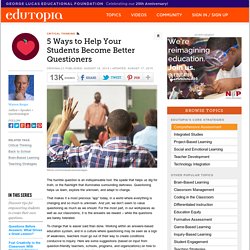
Questioning helps us learn, explore the unknown, and adapt to change. That makes it a most precious “app” today, in a world where everything is changing and so much is unknown. And yet, we don’t seem to value questioning as much as we should. For the most part, in our workplaces as well as our classrooms, it is the answers we reward -- while the questions are barely tolerated. 7 Effective Templates For Teacher Feedback. Feedback in the classroom is often one-sided: the teacher gives feedback and the student receives it, generally relating to the quality of their work.
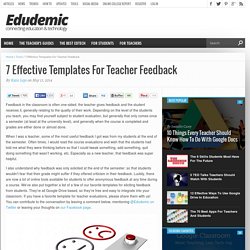
Depending on the level of the students you teach, you may find yourself subject to student evaluation, but generally that only comes once a semester (at least at the university level), and generally when the course is completed and grades are either done or almost done. When I was a teacher, some of the most useful feedback I got was from my students at the end of the semester. Often times, I would read the course evaluations and wish that the students had told me what they were thinking before so that I could tweak something, add something, quit doing something that wasn’t working, etc. Especially as a new teacher, that feedback was super helpful.
5 Course Evaluation Templates To Help Your Students Grade You For A Change. 5 Course Evaluation Templates To Help Your Students Grade You For A Change Quick post we thought might be act as a helpful reminder.
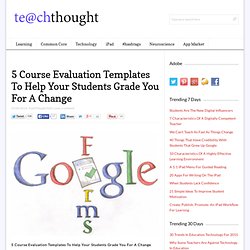
As the end of the school year nears, getting feedback from your students can be an eye-opening experience. And with tools like Google Forms, it’s incredibly easy to use. Six Scaffolding Strategies to Use with Your Students. What’s the opposite of scaffolding a lesson? Saying to students, “Read this nine-page science article, write a detailed essay on the topic it explores, and turn it in by Wednesday.” Lärandets idéhistoria: Dylan Wiliam om lärandets vitala verktyg. 5 Research-Based Tips for Providing Students with Meaningful Feedback.
In recent years, research has confirmed what most teachers already knew: providing students with meaningful feedback can greatly enhance learning and improve student achievement.
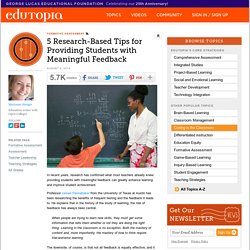
Professor James Pennebaker from the University of Texas at Austin has been researching the benefits of frequent testing and the feedback it leads to. He explains that in the history of the study of learning, the role of feedback has always been central. When people are trying to learn new skills, they must get some information that tells them whether or not they are doing the right thing. Teaching kids to design questions – one piece at a time.
Logan loves to touch everything. He asks lots of questions and I love it… even when I can’t answer the questions. Why is the sky blue? How does a dog breathe? What makes time pass? Kids ask questions every day to make sense of how things work and what things are. 5 Powerful Questions Teachers Can Ask Students. My first year teaching a literacy coach came to observe my classroom. After the students left, she commented on how I asked the whole class a question, would wait just a few seconds, and then answer it myself. "It's cute," she added. Um, I don't think she thought it was so cute. I think she was treading lightly on the ever-so shaky ego of a brand-new teacher while still giving me some very necessary feedback.
So that day, I learned about wait/think time. The Importance of Asking Questions to Promote Higher-Order Competencies. Irving Sigel devoted his life to the importance of asking questions. He believed, correctly, that the brain responds to questions in ways that we now describe as social, emotional, and cognitive development. Questions create the challenges that make us learn. The essence of Irv's perspective is that the way we ask questions fosters students' alternative and more complex representations of stories, events, and circumstances, and their ability to process the world in a wider range of ways, to create varying degrees of distance between themselves and the basis events in front of them, is a distinct advantage to learning. However, Irv found that schools often do not ask the range of questions children need to grow to their potential.
Teaching Questioning Skills to Arm Students for Learning - Work in Progress. In the earliest part of my career, I wrote full procedural lesson plans that spelled out to the letter the questions I would ask AND the answers I considered correct. When the students didn't provide the proscribed answer, I asked helper questions until I elicited the appropriate response. Arbetsgång för formativt läsförståelsearbete i klassrummet. Formative Assessments Are Easier Than You Think! Exit Tickets: Making Learning Effective. 22 Easy Formative Assessment Techniques for Measuring Student Learning. The Most Important Question Every Assessment Should Answer.
The Question Every Assessment Should Be Able To Answer by Terry Heick The difference between assessment of learning and assessment for learning is a crucial one, in many ways indicative of an important shift in education. Traditionally, tests have told teachers and parents how a student “does,” then offers a very accessible point of data (usually percentage correct and subsequent letter grade) that is reported to parents as a performance indicator. Here's an exit slip for reflecting on "bright ideas." What if you marked every book, every lesson? Reinventing the feedback wheel. Poster teacher strategies finished. Critical-thinking-guide.png (666×586) Formative Assessment Classroom Techniques (FACTs)
Examples of Formative Assessment.